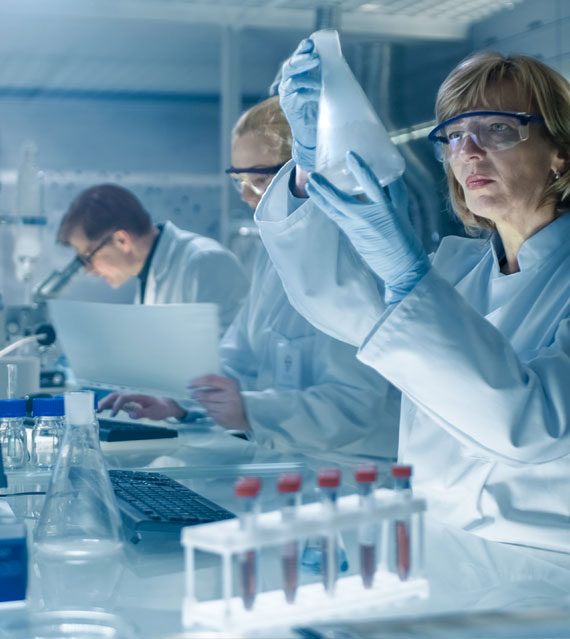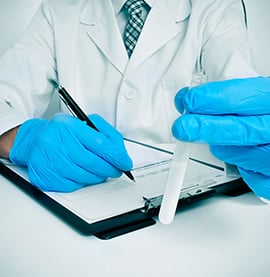
Research
Medical research with the use of stem cells has been ongoing for over 20 years, but we still have much to learn about the healing effects of stem cell transplant medicine. Many patients have experienced successful stem cell transplants from their own cells and from stem cells donated by people with similar genetics. Diseases cannot always be treated with the patients own stem cells, so doctors can search on national registries to find a suitable match. Almost every country has doctors investigating the medical uses of stem cells. With every successful treatment, lives are saved. In the United States, most stem cell treatments are considered clinical trials or research. As this technology advances and long term data is collected from the ongoing research, we may see stem cell therapy used in many more medical applications and regular treatments.
Please visit www.clinicaltrials.gov to learn more about stem cell therapy or how to enroll in an
ongoing clinical trial.
The Celebration Stem Cell Centre only works with non-controversial forms of stem cells derived from umbilical cord blood and adult tissues. The CSCC research department has a universal goal shared by many stem cell banks. To provide the highest quality of viable stem cells to treat patients in need. CSCC uses the latest technology to process and store cord blood, bone marrow and adipose (fat) tissues. We feel that there is substantial data and enough positive patient outcomes to help contribute to this emerging healthcare field. We are not alone! We encourage you to take charge and do your own research to learn about the various medical applications being studied.

Diseases Treated by
Stem Cell Therapy
The medical conditions below are currently being treated with stem cell therapy. In the United States, many stem cell treatments are classified as clinical research. Several other countries are implementing treatments and also conducting clinical trials using stem cells derived from other tissue types. The list is growing every day.
For more information, please visit www.clinicaltrials.gov.
Leukemias, Lymphomas and other Blood Cancers
Acute Biphenotypic Leukemia
Acute Lymphocytic Leukemia (ALL)
Acute Myelogenous Leukemia (AML)
Acute Undifferentiated Leukemia
Adult T Cell Leukemia/Lymphoma
Chronic Lymphocytic Leukemia (CLL)
Chronic Myelogenous Leukemia (CML)
Hodgkin’s Lymphoma
Juvenile Chronic Myelogenous Leukemia (JCML)
Juvenile Myelomonocytic Leukemia (JMML)
Multiple Myeloma
Myeloid/Natural Killer Cell Precursor Leukemia
Non-Hodgkin’s Lymphoma
Prolymphocytic Leukemia
Plasma Cell Leukemia
Waldenstrom’s Macroglobulinemia
Other Cancers
Brain Tumors
Ewing Sarcoma
Neuroblastoma
Ovarian Cancer
Renal Cell Carcinoma
Rhabdomyosarcoma
Small-Cell Lung Cancer
Testicular Cancer
Thymoma (Thymic Carcinoma)
Bone Marrow Failure Disorders
Amegakaryocytosis
Aplastic Anemia (Severe)
Blackfan-Diamond Anemia
Congenital Cytopenia
Congenital Dyserythropoietic Anemia
Dyskeratosis Congenita
Fanconi Anemia
Paroxysmal Nocturnal Hemoglobinuria (PNH)
Pure Red Cell Aplasia
Hemoglobinopathies
Beta Thalassemia Major
Sickle Cell Disease
Histiocytic Disorders
Familial Erythrophagocytic Lymphohistiocytosis
Hemophagocytosis
Langerhans’ Cell Histiocytosis (Histiocytosis X)
Myelodysplastic/Myeloproliferative Disorders
Acute Myelofibrosis
Agnogenic Myeloid Metaplasia (Myelofibrosis)
Amyloidosis
Chronic Myelomonocytic Leukemia (CMML)
Essential Thrombocythemia
Polycythemia Vera
Refractory Anemias (RA) including:
-Refractory Anemia with Excess Blasts (RAEB)
-Refractory Anemia with Excess Blasts in
-Transformation (RAEB-T)
-Refractory Anemia with Ringed Sideroblasts
Inherited Metabolic Disorders
Adrenoleukodystrophy
Fucosidosis
Gaucher Disease
Hunter Syndrome (MPS-II)
Hurler Syndrome (MPS-IH)
Krabbe Disease
Lesch-Nyhan Syndrome
Mannosidosis
Maroteaux-Lamy Syndrome (MPS-VI)
Metachromatic Leukodystrophy
Mucolipidosis II (I-cell Disease)
Neuronal Ceroid Lipofuscinosis (Batten Disease)
Niemann-Pick Disease
Sandhoff Disease
Sanfilippo Syndrome (MPS-III)
Scheie Syndrome (MPS-IS)
Sly Syndrome (MPS-VII)
Tay Sachs
Wolman Disease
Inherited Immune System Disorders
Chronic Granulomatous Disease
Congenital Neutropenia
Leukocyte Adhesion Deficiency
Severe Combined Immunodeficiencies including:
-Adenosine Deaminase Deficiency
-Bare Lymphocyte Syndrome
-Chediak-Higashi Syndrome
-Kostmann Syndrome
-Omenn Syndrome
-Purine Nucleoside Phosphorylase Deficiency
-Reticular Dysgenesis
Wiskott-Aldrich Syndrome
X-Linked Lymphoproliferative Disorder
Other Inherited Disorders
Cartilage-Hair Hypoplasia
Congenital Erythropoietic Porphyria (Gunther Disease)
DiGeorge Syndrome
Osteopetrosis
Other
Chronic Active Epstein Barr
Evans Syndrome
Multiple Sclerosis
Rheumatoid Arthritis
Systemic Lupus Erythematosus
Thymic Dysplasia
Emerging Stem Cell Applications
Brain Injury
Spinal Cord Injury
Muscle & ligament regeneration
Wound Care / Burns
Cerebral Palsy
Parkinson’s Disease
Type 1 Diabetes
Heart Disease
